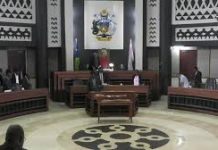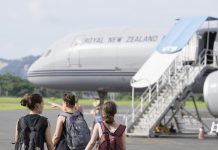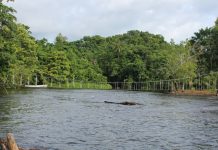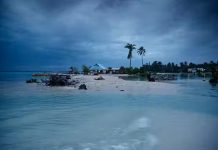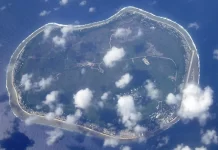This week at the International Seabed Authority (ISA) headquarters in Kingston, Jamaica, negotiations to agree a ‘mining code’ get into their third week at the Authority’s 28th Council meeting.
If adopted, the mining code would give destructive deep-sea mining the go ahead, opening our ocean to the largest mining operation humanity has ever seen.
The negotiations have faced increased scrutiny in the face of the multiple risks surrounding the industry, and a greater number of observer organisations present than previously seen, testament to the growing chorus of voices across society calling for a stop. The DSCC are present in Kingston for the meeting, running from the 16th – 31st March.
Negotiations so far have seen Vanuatu officially join the call for a precautionary pause on the industry, encouraging “fellow pacific states who have expressed an interest in deep-sea mining to step back from the brink and join us in a precautionary approach as a region and as a world.” Finland’s Special Adviser to the Minister for Foreign Affairs also stated on Twitter that Finland “support a precautionary pause.” During negotiations, Spain, the Federated States of Micronesia, Germany, France, Palau, Fiji and Panama also echoed their support for a precautionary pause or moratorium to the industry.
Campaigners and Pacific activists arrived at the meeting on the Greenpeace ship, Arctic Sunrise, bringing Indigenous voices from across the Pacific to negotiations. Indigenous delegates have highlighted a lack of social licence for the industry to go ahead throughout the meeting, a lack of consideration of the cultural value of the deep and a lack of consideration of Indigenous and traditional knowledge. The Alliance of Solwara Warriors’ Jonathan Mesulam also highlighted the vital importance of free prior informed consent during negotiations, warning of the realities of deep-sea mining from experience in Papua New Guinea.
Negotiations so far have seen a growing recognition across members of the ISA Council of the irreversible nature of mining the deep, and the fact that any notion of restoration is scientifically meaningless. The Deep Ocean Stewardship Initiative (DOSI) drew delegates attention to the fact that there have been no long-term large-scale deep-sea mining restoration experiments carried out. An official side event by DOSI also highlighted glaring gaps in scientific understanding of the impacts the industry would have on biodiversity and climate, if permitted to go ahead. The climate implications of deep-sea mining and the lack of consideration within draft regulations have also been spotlighted by observers and States, underscoring the risks the industry poses to carbon locked away in the seabed, as well as greenhouse gas emissions from mining operations.
Observers and States also pointed to a lack of effective control and compliance of would-be mining companies. The DSCC and others highlighted a prospective miner’s recent violation of the terms of its exploration contract, a lack of transparency across ISA on the nature of the violations, and the fact that the ISA has not taken punitive action.
On Friday 24th March, discussions focused on what would happen if rules, regulations and procedures are not agreed before July 2023 (the deadline of the two-year rule, a legal loophole triggered by Nauru on behalf of Nauru Ocean Resources Inc (NORI) a subsidiary of The Metals Company (TMC). Multiple delegations indicated that deep-sea mining should not occur before rules, regulations and procedures are agreed, including GRULAC countries (Latin American and Caribbean), the African Group, Switzerland, Russia, Portugal, New Zealand, France, the Federated States of Micronesia, and the United States of America. Norway and Japan called for the conclusion of negotiations by July 2023. Several delegations expressed that a provisional approval to mine should not automatically lead to a contract.
The risks associated with the industry and the lack of transparency surrounding the ISA have continued to hit the headlines since negotiations got underway. The New York Times reported that ISA member States, Germany and Costa Rica had highlighted the lack of impartiality of the ISA Secretary General. The growing lack of faith in the industry was also underlined by Bloomberg who reported that one of the biggest deep-sea mining players, UK Seabed Resources, a subsidiary of Lockheed Martin, had stepped away from the risky industry. The Guardian also highlighted the permanent and widespread impacts the industry would have on climate and environment, sharing the release of an updated scientific report from Flora and Fauna International.
SOURCE: DEEP SEA CONVERSATION COALITION/PACNEWS



